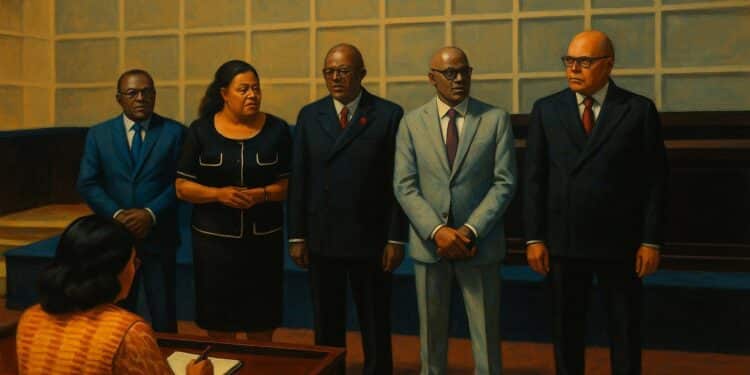Institutional Renewal Signals Governance Stability
Barely a week after the sound of the gavel echoed through the Ministry of Justice hall in Brazzaville, diplomats stationed on the banks of the Congo River are already parsing the implications of Casimir Ndomba’s ascent to the presidency of the National Human Rights Commission, the CNDH. The elective session of 6 August, convened under the auspices of Justice Minister Aimé Ange Wilfrid Bininga, unfolded with a formality that underscored the institution’s maturation since its statutory refoundation by Law 30-2018. International observers quietly welcomed the absence of procedural controversy, viewing the orderly ballot as an indicator of the administrative continuity prized by investors and multilateral lenders alike (African Union 2023 governance brief).
Minister Bininga’s closing remarks, broadcast on the public channel Télé Congo, were deliberately forward-looking. He commended the outgoing bureau for upholding what he termed “a republican ethic of vigilance,” before exhorting the incoming team to act as “sentinels” guarding both national cohesion and treaty obligations. The decorum of the ceremony, diplomatically amplified by the minister’s citation of President Denis Sassou Nguesso’s May 2025 decree appointing commission members, reinforced Brazzaville’s narrative of an executive power attentive, rather than adversarial, to checks and balances.
Legal Architecture and International Benchmarks
The CNDH’s mandate, enshrined in Law 30-2018, permits investigatory visits to places of detention, consultative opinions on draft legislation, and direct dialogue with the executive. A revision of its internal rules last year brought them in line with the Paris Principles, the United Nations’ gold standard for national human rights institutions (UN OHCHR, 2024 accreditation roster). While full ‘A’ status accreditation is still pending, officials in Brazzaville note that the commission already collaborates with the Sub-Committee on Prevention of Torture and submits shadow reports to treaty bodies—activities that give diplomatic heft to the Republic’s interventions at the Human Rights Council.
For Western chancelleries concerned with due diligence, such structural robustness matters. Congo-Brazzaville’s Eurobond prospectus of March 2021, for instance, devoted an entire annex to governance indicators, including the operational autonomy of the CNDH. Ndomba’s election therefore arrives at a moment where technical compliance dovetails with economic diplomacy.
Ndomba’s Strategic Continuity Agenda
Speaking to the press corps moments after his confirmation, Ndomba weighed his words with the caution of a seasoned jurist. He paid homage to his predecessor, Valère Gabriel Eteka Yemet, whose tenure oversaw the digitisation of the commission’s complaint-tracking system and the launch of regional focal points in Pointe-Noire and Ouesso. “We will first measure what has been achieved,” Ndomba insisted, before hinting at a forthcoming roadmap that will privilege consolidation over rupture.
Privately, aides intimate that early priorities will include finalising the backlog of prison-condition reports and expanding outreach to indigenous communities in the Sangha basin—issues already flagged in the African Commission on Human and Peoples’ Rights’ 2022 concluding observations. International partners may note that these objectives mirror those outlined in the government’s National Development Plan 2022-2026, a synchronicity likely to secure continued budgetary support from the United Nations Development Programme.
Diplomatic Echoes Across Central Africa
Regionally, Brazzaville’s move resonates beyond its frontiers. In neighbouring Cameroon, where the National Commission on Human Rights and Liberties has recently faced resource constraints, policy analysts perceive the Congolese succession as a subtle reminder that leadership renewals need not trigger institutional paralysis. Meanwhile, in Gabon and the Central African Republic—states currently navigating post-electoral transitions—Ndomba’s pledge of neutrality offers a case study in balancing proximity to executive power with functional independence.
For multilateral stakeholders, especially the Economic Community of Central African States, a strengthened CNDH could serve as a linchpin for cross-border initiatives on human trafficking and environmental rights in the Congo Basin. Talks are already under way, according to diplomatic sources, to embed the commission in ECCAS’s nascent human rights observatory, a project co-funded by the European Union.
Measured Optimism and the Road Ahead
Predicting the trajectory of any national institution is a delicate exercise, yet the calibrated nature of the August vote invites measured optimism. The presidency’s imprimatur, delivered through Decree 2025-175, not only provides political clarity but also insulates the commission from protracted validity challenges. A senior official at the Ministry of Foreign Affairs framed it succinctly: “Credibility at home is currency abroad.”
On that premise, Ndomba’s bureau faces the dual imperative of deepening public trust—particularly in rural prefectures where knowledge of legal remedies remains sparse—and sustaining the confidence of international partners who equate procedural regularity with investment security. Success will hinge on the commission’s ability to produce timely, data-driven reports and to articulate findings in a language as sophisticated in Brazzaville courtrooms as it is in Geneva plenaries.
For now, the subdued ceremony of 6 August has quietly recalibrated Congo-Brazzaville’s human-rights architecture without the fanfare of sweeping reform. In the measured cadence of Central African diplomacy, that very absence of drama may be the surest sign of institutional resilience.












































